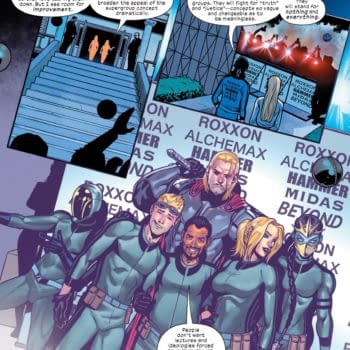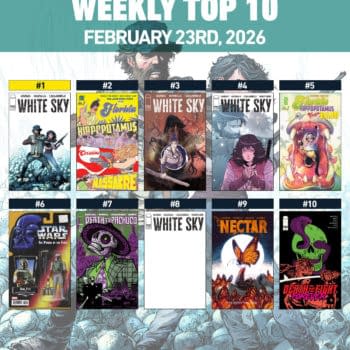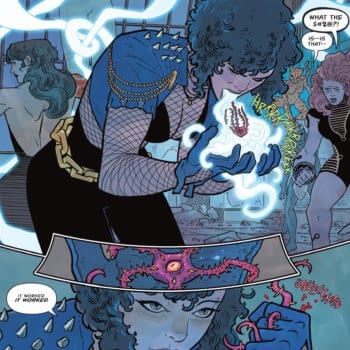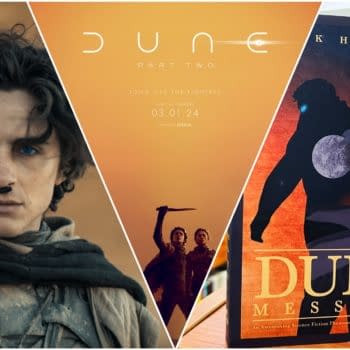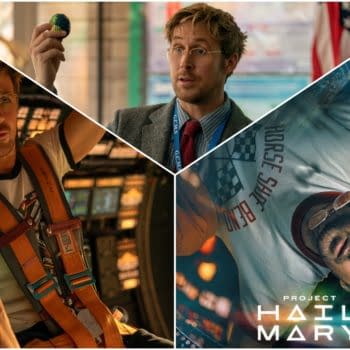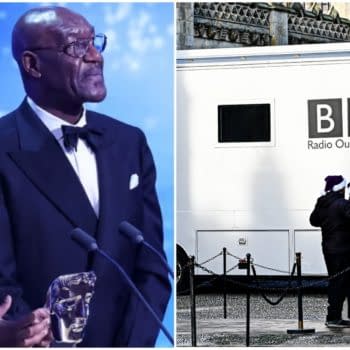Posted in: Look! It Moves! by Adi Tantimedh, Movies, Recent Updates | Tagged: erica li, film, herman yau, ip man
Screenwriter Erica Li And Director Herman Yau Discuss Ip Man: The Final Fight With Adi Tantimedh: Look! It Moves!
Adi Tantimedh writes;
Ip Man: The Final Fight, the latest movie from Hong Kong to feature the legendary Wing Chun master, opened in select cinemas across the US this past weekend, and has been on Video On Demand for a few weeks now. You should see it.
[youtube]http://www.youtube.com/watch?v=2Qyx0Wm90Qs[/youtube]
Ip Man: The Final Fight begins with Ip Man arriving in Hong Kong at the end of the 1940s and follows his life of exile in the British colony through the 1950s and 1960s, starting his school and taking on students, introducing the Wing Chun form to Hong Kong and witnessing the rapid social change of the next few decades. Along the way, he copes with personal tragedies and health problems even as he maintains his personal code of honour and decency through periods of turmoil and martial arts become part of pop mythology and gang culture in Hong Kong. The fights are filmed in real time and star Anthony Wong reportedly trained for a year before production began so that they appeared as authentic as possible on film.
Director Herman Yau and screenwriter Erica Li went to great lengths to recreate the Hong Kong of the post-War years while interweaving the conventions of kung fu movies into a meticulous portrait of Old Hong Kong that's been lost in time. This is not new to Yau, a prolific director who has been active since the 1990s, having made movies in just about every imaginable genre in Hong Kong cinema, from gangster movies to serial killer exploitation flicks to horror to comedies to social issue movies and even documentaries about the plights of sex workers. What distinguishes his work is the attention to sociological detail, capturing the nuances of the society in which the stories of his movies are set.
I interviewed the screenwriter Erica Li and director Herman Lau via Skype last week.
I think Ip Man: The Final Fight is the best of the Ip Man movies because it creates a very strong sense of the social structure of Hong Kong and what people were like in the 1950s and 1960s and the way that it recalls old Hong Kong social drama movies like the old black and white movies that are rerun on television and the Shaw Brothers'The House of 72 Tenents.
The first question I want to ask is, with so many other Ip Man movies already made, including Herman's prequel Ip Man: The Legend is Born, then Wong Kar-Wai announcing The Grandmaster, what prompted you to make this entry?
Herman: First and foremost, it was commercial consideration, because Ip Man is quite popular recently. And I tried to make it a decent one, and also with the contemporary social context in Hong Kong now, we wanted to emphasise the story of Ip Man, and also Hong Kong.
I like how you outlined how social relationships in Hong Kong after the Second World War through the 50s and 60s, the way women and men related to each other, like the one detail where the women reacted to Ip Man's new female friend after his wife has died. That's something that I've witnessed in real life in Chinese society. I thought it was incredibly accurate.
Erica: For me, it is the lost values in Hong Kong. It's like travelling in time to find the old values. Nowadays people have different morality levels and social values. The political and social situations are quite parallel compared to those days.
So how much research did you have to do? You had to create an Old Hong Kong, a lot of which isn't there anymore.
Herman: We worked on two aspects: one is Ip Man as a character, another is the social context that Ip man lived in. For the social contexts of the time, we spent a long time in research, because other than what we can know from the literature, we had to find a lot of photos. Those old photos are in black and white, and we shoot in colour. It took a long time for the Art Department to sort out the colour, the materials and the location as a whole.
So how much of the movie was shot on a real location and how much of it was shot on a studio set? It felt like you had to build an entire block of Old Hong Kong on a studio lot. Was it a set in China or Hong Kong?
Herman: All the sets were tailor-made for this movie. No scenes were shot on a real location but on stages. On the other hand, after we finished Ip Man: The Final Fight, all the sets remains and they're going to rent out them out for other movie and TV companies.
What strikes me about the movie is also the way the story uses Ip Man as a kind of bridge between Old China and Modern Hong Kong, the way it juxtaposes his Old School Confucian morality and decency against a world that's changing. I assume that was a way to use Ip Man as a prism to examine the way Hong Kong was changing quickly in the Fifties and Sixties, all the way to the early Seventies.
Herman: Ip Man was coming from the Chinese Mainland with many Chinese customs and traditions, and Hong Kong was a British colony at that time, so he was an aging Chinese man encountering that so-called Western Modernity, and when I say 'modernity', it includes the humanity of the people at that time. Comparatively, Hong Kong is not so comtemplative as the people in the Mainland. It's not so much a conflict, but sometimes in his mind, some things contradicted each other, in the Chinese-ness and the Western modernity.
Erica: I think it's quite similar to the situation now, especially after the 1997 Handover from Hong Kong to China. It's all about peacefully adapting to big changes, because different cultures and fashions blend together, and Ip Man as a protagonist, how he went with the flow of the changes. It's similar to the people in Hong Kong nowadays.
Pix:
I can see the parallel, because Hong Kong is facing even more change because so many Mainland Chinese are coming over and spending money to buy up the real estate and just changing Hong Kong to the point where I'm not even sure I would recognise the Hong Kong now from the Hong Kong I saw ten years ago.
Erica: True.
The movie also feels like a way for you to reclaim Hong Kong before too much of it is lost forever.
Erica: For me, I can see history through movies. Movies are a sort of historical archive for laymen.
That's what I believe as well. A lot of Hong Kong movies from the last 25, 30 years are essentially social documents. I could, say, get a DVD of one of Herman's movies from 1994 and be taken back to that era, because Hong Kong doesn't even look like that anymore. Those locations are vaguely the same, but are very different now.
Herman: Yeah, Hong Kong has changed a lot in the past ten to fifteen years. Even in the archeology of the development, what the government wanted was to catch up with Western countries as a colony, and regain original power.
Erica: Before they disappear, hopefully we can document things in a drama. I would say with over-development on the one hand, on the other hand we need someone to do a preservation of History or even some of the natural landscape in Hong Kong. It's actually a war.
There's the way you recreated The Walled City in a way I hadn't seen in a Hong Kong movie before. I was really impressed with that. And creating the social context of The Walled City to explain what it was and why it was there, what was what really struck me.
Erica: The Walled City is like a paradox for me, because it was an enclosed environment. At the same time, no one was in charge of it. It was a weird place…
A kind of No Man's Land.
Herman: It's the opposite of a utopia.
I'd like to hear your thoughts on the reactions to the film so far. It's gotten some of the best reviews of any movie this year, especially from American critics.
Erica & Herman: Thank you.
I'm not the only one who thinks it's the best of the Ip Man movies. I do like Wong Kar Wai's The Grandmaster, but in many ways I like The Final Fight better because of its social context.
Herman: Thank you. It was our intention from the beginning to contextualise the character of Ip Man, the drama and the situation of the time.
It's interesting to watch The Grandmaster first, then watch Ip Man: The Final Fight, because suddenly, all the things that were obscure in The Grandmaster are very clearly explained in Ip Man: The Final Fight. You come to understand Ip man the man rather than Ip Man the myth and it gives you a much clearer understanding of Hong Kong society and Cantonese culture from that period as well.
Herman: When you try to compare the two movies, they're like footnotes to each other.
Erica: For me, it's the journey from a myth back to a man. Before the first Ip Man movie, most people didn't really know who he was. When I started to write the script, they gave me Anthony Wong, a superhero in old age, so I needed to write a superhero as flesh and blood. As a human being. A hero fading away.
AT: I admired the fact that you didn't use too many trick shots or slow motion or wire-fu.
Herman: I tried to avoid it.
I understand that Anthony Wong trained in Wing Chun for a whole year before you started shooting?
Herman: That's true.
American martial arts movie fans prefer the fights to be as real as possible, with as little wire-fu as possible. This might be another reason why a lot of them like Ip Man: The Final Fight so much.
Last question: I was wondering how the movie was received in China and in Hong Kong. Was there any difference in how Mainland audiences and Hong Kong audiences felt about this film?
Herman: It's been quite positive in the Mainland and in Hong Kong, but the box office in the Chinese Mainland is not so good. The box office in Hong Kong is quite good. The comments were on the positive side.
That's revealing, because I feel that the Ip Man movies, especially Wong Kar Wai's and yours, go a long way towards claiming him as a Hong Kong folk hero, slightly more than a Mainland folk hero though he does bridge the gap.
Herman: Thank you.
(Thanks to Emma Griffiths and Jasmine Davis for arranging the interview)
Dreaming of Hong Kong at lookitmoves@gmail.com
Follow the official LOOK! IT MOVES! twitter feed at http://twitter.com/lookitmoves for thoughts and snark on media and pop culture, stuff for future columns and stuff I may never spend a whole column writing about.
Look! It Moves! © Adisakdi Tantimedh






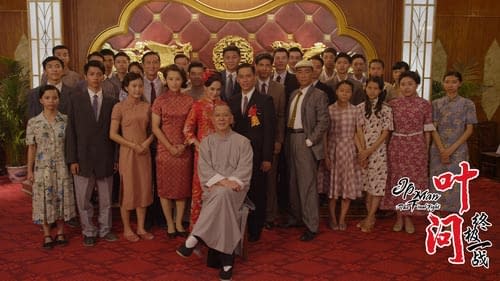




![White Sky #]1 second printing](https://mlpnk72yciwc.i.optimole.com/cqhiHLc.IIZS~2ef73/w:350/h:350/q:75/rt:fill/g:ce/https://bleedingcool.com/wp-content/uploads/2026/02/unnamed-2026-02-18T203050.994-350x350.jpg)
